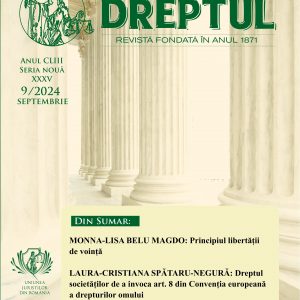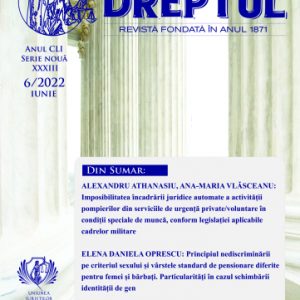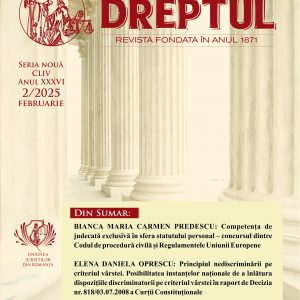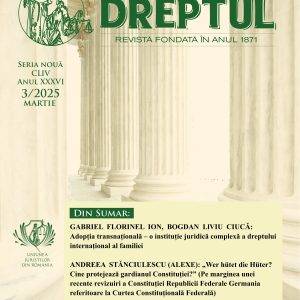-
 As subject of public international law, the European Union is committed not only to observe, but also to develop the public international law and, within this framework, it is established the principle of equality between the Member States, within the limits of the treaties of the Union. The institutional structure of this intergovernmental international organization and the procedure of adoption of the legal acts reflect a nuanced equality between the Member States, which however emphasizes the specificity of the Union. „United in diversity”, a motto to which, according to the Declaration No 52 to the Treaty of Lisbon, not all Member States have subscribed, the European Union promotes an enhanced integration and a political cooperation in which the States act in accordance with the Treaties and, in certain cases, for the purpose of supporting the national interest. The transfer of competences from the States to the Union was achieved gradually, with the economic and political evolution at national and international level, pursuant to the state sovereignty. Equality between states within the European Union is a principle whose application in the current European and international context might reflect a new approach of the European integration and positioning of the Member States within the Union.
As subject of public international law, the European Union is committed not only to observe, but also to develop the public international law and, within this framework, it is established the principle of equality between the Member States, within the limits of the treaties of the Union. The institutional structure of this intergovernmental international organization and the procedure of adoption of the legal acts reflect a nuanced equality between the Member States, which however emphasizes the specificity of the Union. „United in diversity”, a motto to which, according to the Declaration No 52 to the Treaty of Lisbon, not all Member States have subscribed, the European Union promotes an enhanced integration and a political cooperation in which the States act in accordance with the Treaties and, in certain cases, for the purpose of supporting the national interest. The transfer of competences from the States to the Union was achieved gradually, with the economic and political evolution at national and international level, pursuant to the state sovereignty. Equality between states within the European Union is a principle whose application in the current European and international context might reflect a new approach of the European integration and positioning of the Member States within the Union. -
 The promotion and protection of the rights of the child has always been one of the main objectives of the European Union, but it is also a result of international commitments. All Member States of the European Union have ratified the UN Convention on the Rights of the Child, and the rules and principles of this Convention guide the policies and the actions of the Union that impact on the rights of the child. The Lisbon Treaty has conferred greater importance to the objectives of the European Union, and by Article 3 (3) of the UN Convention on the Rights of the Child it was explicitly established the imperative obligation to promote the protection of the rights of the child. In addition, the rights of the children are enshrined in the Charter of Fundamental Rights of the European Union, which by Article 24 recognizes children as independent and autonomous holders of rights, also considering the best interest of the child as paramount in relations with the public authorities and the private institutions. The transposition of the European and international objectives, as well as of the fundamental principles referring to the protection of the rights of the child took place naturally through the adoption of new national regulations reflecting the acquiescence of Romania to the European objectives and its constant concern for the protection of the rights of the child. However, in many cases there are encountered in practice situations where, although there are both the legal basis and the mechanisms necessary for its implementation, the rights of the children are not respected and/or are not given due importance. This paper aims to draw attention once again to the essential rights of children and to emphasize the fundamental principles referring to the promotion and protection of rights of the children, with particular regard to the principle of the best interest of the child, as regulated at European level.
The promotion and protection of the rights of the child has always been one of the main objectives of the European Union, but it is also a result of international commitments. All Member States of the European Union have ratified the UN Convention on the Rights of the Child, and the rules and principles of this Convention guide the policies and the actions of the Union that impact on the rights of the child. The Lisbon Treaty has conferred greater importance to the objectives of the European Union, and by Article 3 (3) of the UN Convention on the Rights of the Child it was explicitly established the imperative obligation to promote the protection of the rights of the child. In addition, the rights of the children are enshrined in the Charter of Fundamental Rights of the European Union, which by Article 24 recognizes children as independent and autonomous holders of rights, also considering the best interest of the child as paramount in relations with the public authorities and the private institutions. The transposition of the European and international objectives, as well as of the fundamental principles referring to the protection of the rights of the child took place naturally through the adoption of new national regulations reflecting the acquiescence of Romania to the European objectives and its constant concern for the protection of the rights of the child. However, in many cases there are encountered in practice situations where, although there are both the legal basis and the mechanisms necessary for its implementation, the rights of the children are not respected and/or are not given due importance. This paper aims to draw attention once again to the essential rights of children and to emphasize the fundamental principles referring to the promotion and protection of rights of the children, with particular regard to the principle of the best interest of the child, as regulated at European level. -
 The European Union law principles can be source of Community law, as they have the same rank as the treaties in the hierarchy of the EU law sources. These principles are compulsory both for the EU institutions and the Member States. These binding principles include the principle of legality of indictment and punishment. Therefore, whenever a Community act requires Member States to establish punishments to be used in the event an offense provided for in that act, they must comply with. There are also some exceptions to this rule (the compulsoriness for the European Union Member States): the criminal liability of the person who committed the offense cannot be determined nor can be aggravated by breaching the Community act independently of a domestic law adopted by a Member State in view of its implementation. In this study, the authors analyze the exceptions to the principle of legality of indictment and punishment, which have a particular interest in criminal matters, given the contradictions in the Romanian and foreign criminal doctrine.
The European Union law principles can be source of Community law, as they have the same rank as the treaties in the hierarchy of the EU law sources. These principles are compulsory both for the EU institutions and the Member States. These binding principles include the principle of legality of indictment and punishment. Therefore, whenever a Community act requires Member States to establish punishments to be used in the event an offense provided for in that act, they must comply with. There are also some exceptions to this rule (the compulsoriness for the European Union Member States): the criminal liability of the person who committed the offense cannot be determined nor can be aggravated by breaching the Community act independently of a domestic law adopted by a Member State in view of its implementation. In this study, the authors analyze the exceptions to the principle of legality of indictment and punishment, which have a particular interest in criminal matters, given the contradictions in the Romanian and foreign criminal doctrine. -

-
 Article 5 of the Civil Procedure Code1 regulates the fundamental principle of free access to justice and the obligations that the legislator establishes as duty of the judge are meant to outline this principle2 . Free access to justice is a fundamental principle of the organization of any democratic judicial system, being enshrined in an important number of international documents, therefore it has special meanings both for procedural law and for the constitutional law3 .
Article 5 of the Civil Procedure Code1 regulates the fundamental principle of free access to justice and the obligations that the legislator establishes as duty of the judge are meant to outline this principle2 . Free access to justice is a fundamental principle of the organization of any democratic judicial system, being enshrined in an important number of international documents, therefore it has special meanings both for procedural law and for the constitutional law3 . -
 In this article, the author aims to analyze the theoretical foundations of two essential principles for the state of law and how to balance the relations between the three powers: the principle of constitutional loyalty and the principle of loyal institutional collaboration between the public authorities vested with the governing powers. The two principles are not formally provided in the text of the Constitution, but can be deduced by way of interpretation from other constitutional principles. As for the first principle, the author shows that it has its source in the obligation freely assumed by each member of a community of individuals organized according to the principles of social hierarchy, or imposed by the public authority with supreme force in the community, to respect a summum of legal norms, whose purpose consists in the regulation and harmonization of the social relations. The origin of the second principle is found in the principle of separation of the three powers in the state, which in the governing process are obliged to collaborate loyally with each other, within the institutional framework prescribed by the constitutional norm. In the end, the author concludes that the substance of the principle of constitutional loyalty includes not only the general obligation of citizens and of both public authorities and institutions to respect the will of the Constituent Legislator formally expressed in the text of the Constitution, but also the obligation of the STATE and of each public authority provided in the Constitution, to be loyal to the CITIZEN. Otherwise, the relations between the state and the citizen are compromised, or will take the form and content of totalitarian-type relations, in which the individual is deprived of rights and absorbed by the state as a dehumanized form of life. The author considers that the loyalty of the state towards the citizen is an obligation of constitutional rank and, on this basis, he proposes, de lege ferenda, its express inclusion in the text of the Constitution at a future revision thereof.
In this article, the author aims to analyze the theoretical foundations of two essential principles for the state of law and how to balance the relations between the three powers: the principle of constitutional loyalty and the principle of loyal institutional collaboration between the public authorities vested with the governing powers. The two principles are not formally provided in the text of the Constitution, but can be deduced by way of interpretation from other constitutional principles. As for the first principle, the author shows that it has its source in the obligation freely assumed by each member of a community of individuals organized according to the principles of social hierarchy, or imposed by the public authority with supreme force in the community, to respect a summum of legal norms, whose purpose consists in the regulation and harmonization of the social relations. The origin of the second principle is found in the principle of separation of the three powers in the state, which in the governing process are obliged to collaborate loyally with each other, within the institutional framework prescribed by the constitutional norm. In the end, the author concludes that the substance of the principle of constitutional loyalty includes not only the general obligation of citizens and of both public authorities and institutions to respect the will of the Constituent Legislator formally expressed in the text of the Constitution, but also the obligation of the STATE and of each public authority provided in the Constitution, to be loyal to the CITIZEN. Otherwise, the relations between the state and the citizen are compromised, or will take the form and content of totalitarian-type relations, in which the individual is deprived of rights and absorbed by the state as a dehumanized form of life. The author considers that the loyalty of the state towards the citizen is an obligation of constitutional rank and, on this basis, he proposes, de lege ferenda, its express inclusion in the text of the Constitution at a future revision thereof. -
 This doctoral research investigates the case law development of the principle of loyalty within the framework of the invisible constitution theory. Uncodified counterpart of written constitutional rules, the invisible constitution belongs to a broader understanding of the concept, specifically the constitution in its material sense. Contemporary examples are found within the British constitutional order (e.g. constitutional conventions and case law), the French bloc de constitutionnalité (i.e. complementary unwritten rules) and the case law of the Hungarian Constitutional Court (i.e. the Sólyom model). Assuming a national invisible constitution exists, the paper aims to demonstrate that the principle of loyal cooperation belongs to such an invisible dimension of the Romanian constitutional order.
This doctoral research investigates the case law development of the principle of loyalty within the framework of the invisible constitution theory. Uncodified counterpart of written constitutional rules, the invisible constitution belongs to a broader understanding of the concept, specifically the constitution in its material sense. Contemporary examples are found within the British constitutional order (e.g. constitutional conventions and case law), the French bloc de constitutionnalité (i.e. complementary unwritten rules) and the case law of the Hungarian Constitutional Court (i.e. the Sólyom model). Assuming a national invisible constitution exists, the paper aims to demonstrate that the principle of loyal cooperation belongs to such an invisible dimension of the Romanian constitutional order. -
 The national legislation on social security provides for different standard retirement ages for women and men, and this aspect does not contravene the principle of non-discrimination on the basis of sex in social security matters, enshrined in Directive 79/7/EEC of 19 December 1978 on the progressive implementation of the principle of equal treatment for men and women in matters of social security, nor the principle of equality of citizens, enshrined in Article 16 of the Romanian Constitution. However, failure to apply the more favourable age conditions, laid down for women, to people who have changed their gender identity from woman to man may give rise to discrimination on the grounds of sex. The rationale for maintaining different standard retirement ages is based on the socio-professional disadvantages of women in Romania in relation to men, so that being a woman during their working lives justifies the application of a lower retirement age, regardless of whether at the time of retirement, following the change of gender identity, the beneficiary of the pension is a man, and not a woman. As national law does not regulate this issue, it is for the national courts to interpret social security legislation in accordance with the principle of non-discrimination on grounds of sex. The existence of different standard retirement ages for women and men does not automatically lead to the de jure termination of employment relationships as a result of retirement at different ages, as Article 56 of the Labour Code regulates the possibility of termination of employment relationships, for both sexes, at the same age. Nor does the change in gender identity give rise to different treatment, on the basis of sex, on the date of the termination of employment relationships as a result of the fulfilment of retirement conditions.
The national legislation on social security provides for different standard retirement ages for women and men, and this aspect does not contravene the principle of non-discrimination on the basis of sex in social security matters, enshrined in Directive 79/7/EEC of 19 December 1978 on the progressive implementation of the principle of equal treatment for men and women in matters of social security, nor the principle of equality of citizens, enshrined in Article 16 of the Romanian Constitution. However, failure to apply the more favourable age conditions, laid down for women, to people who have changed their gender identity from woman to man may give rise to discrimination on the grounds of sex. The rationale for maintaining different standard retirement ages is based on the socio-professional disadvantages of women in Romania in relation to men, so that being a woman during their working lives justifies the application of a lower retirement age, regardless of whether at the time of retirement, following the change of gender identity, the beneficiary of the pension is a man, and not a woman. As national law does not regulate this issue, it is for the national courts to interpret social security legislation in accordance with the principle of non-discrimination on grounds of sex. The existence of different standard retirement ages for women and men does not automatically lead to the de jure termination of employment relationships as a result of retirement at different ages, as Article 56 of the Labour Code regulates the possibility of termination of employment relationships, for both sexes, at the same age. Nor does the change in gender identity give rise to different treatment, on the basis of sex, on the date of the termination of employment relationships as a result of the fulfilment of retirement conditions. -

-
 The principle of opportunity is applied in all criminal legislations, although some leave it unmentioned and others expressly establish it. The author analyses the evolution of this principle, starting from the former criminal legislation to the criminal legislation in force, pointing out the advantages of the new regulation.
The principle of opportunity is applied in all criminal legislations, although some leave it unmentioned and others expressly establish it. The author analyses the evolution of this principle, starting from the former criminal legislation to the criminal legislation in force, pointing out the advantages of the new regulation. -
 Înscrierile în cartea funciară nu au caracter constitutiv/translativ, ci numai efecte de opozabilitate față de terți (art. 25 din Legea nr. 7/1996 arată că „înscrierile în cartea funciară își vor produce efecte de opozabilitate față de terți...”). Astfel, această lege asigură publicitatea imobilului și nu are efecte constitutive/translative ale dreptului de proprietate. (...)
Înscrierile în cartea funciară nu au caracter constitutiv/translativ, ci numai efecte de opozabilitate față de terți (art. 25 din Legea nr. 7/1996 arată că „înscrierile în cartea funciară își vor produce efecte de opozabilitate față de terți...”). Astfel, această lege asigură publicitatea imobilului și nu are efecte constitutive/translative ale dreptului de proprietate. (...) -

